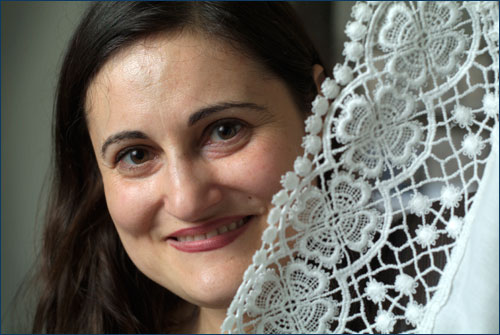
Prof. Alla Myzelev, Fine Art and Music, had just settled in to take notes about old documents at the Russian State Library in Moscow and was about to plug in her laptop when a librarian rushed over to stop her. Baffled, Myzelev asked what was wrong. “You’ll blow all the fuses!” she was told.
“I could work for only the couple of hours my batteries lasted each time I went,” she says.
Because the library was built in 1862, it wasn’t surprising that it had a few electrical problems, but it was a challenge that Myzelev, who joined U of G in September 2008, hadn’t expected.
“The next part of my research was in London, England, and that was much less eventful.”
The challenges and quirks of life in various countries are rarely a surprise to Myzelev, who grew up in Kiev, Ukraine, then moved to Jerusalem with her family as a teenager and attended Hebrew University. At 21, she moved to Canada and did a master’s degree at York University and a PhD at Queen’s. From there, she did a post-doctoral stint at the University of Western Ontario before coming to Guelph.
Myzelev’s interests lie in design, crafts and architecture. She’s currently writing a book about Canadian art deco design and working on another about architecture in Toronto in the early 20th century.
“At that time, Toronto’s architecture was allied stylistically to British architecture,” she says. “People said they wanted to have their own Canadian designs, but really what they built was very British. I think it expressed some nostalgia, as well as a longing for grandeur and culture.”
By the 1930s, however, architectural design had become more cosmopolitan, she says.
“People wanted something that looked modern, and art deco became popular. Art deco was modern but not cutting-edge.”
One house Myzelev is particularly interested in was designed by a Russian immigrant for Group of Seven artist Lawren Harris.
“She was an artist and an architect, and she created this unusual design — a house with long, thin windows and wide bricks.”
The house was built in 1930, and Harris lived there for only a year, but it still stands in the Forest Hill section of Toronto.
“There are few photos of the home’s interior and little information about the public reaction to the house,” says Myzelev, who’s hoping to learn more through her research.
For her doctoral dissertation, she looked at craft revival in the United Kingdom and Russia in the late 19th and early 20th centuries, research that required travelling to both countries.
“There was a revival in traditional crafts during this time period because, as industrialization grew, people were afraid that the old crafts would be forgotten,” she says. “I was intrigued because the revivals were similar in England and Russia, and I was trying to find out what the connection might be.”
Traditional thinking on the issue was that the revival started in England with the Arts and Crafts Movement, then spread to Russia. Myzelev found that the concept did start in England and that the country’s early crafts bazaars were featured in magazines that were read by Russians.
Russia began offering workshops where trained artists taught people how to do traditional crafts, and these workshops became enormously popular and successful, she says.
“They made wonderful crafts with a Russian flavour that was very exotic to the British. They actually opened stores in London and sold crafts there.”
The British admired the Russian success and wanted to create something along the same lines, and it was through these interactions that the crafts revival in both countries grew and flourished, she says.
Myzelev is also interested in the connections among crafts, design and changing lifestyles. She’s noticed, for example, how popular knitting has become, “and I’m intrigued by the links between knitting and third-wave feminism.”
She herself is an enthusiastic knitter and also enjoys doing ceramics. “I love being creative and studying creativity and sharing that passion with others.”